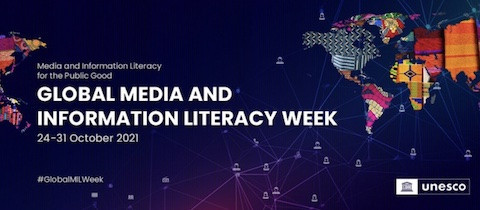
GCED Basic Search Form
Quick Search
Вы здесь
Новости

Global Media and Information Literacy Week 2021
The current information ecosystem keeps evolving in complex ways - opening up new opportunities but also challenges. It is hard to conceive of the public good being advanced, if the public is disempowered by false and misleading content, conspiracies theories and hate speech. However, media and information literacy empowers people to develop themselves and their societies through enhanced capacities in communication and information. Media and information literate people are equipped to better respond to potentially harmful kinds of content.
These issues will be the focus of 2021 edition of the annual Global Media and Information Literacy Week will be commemorated on 24-31 October 2021, under the theme “Media and Information Literacy for the Public Good”. It is co-organized by South Africa and UNESCO in cooperation with the European Commission. Its Feature Conference and Youth Forum will take place online, alongside celebration events around the globe.
Among many other sessions, heads of major intergovernmental organizations such as the European Commission, African Union Commission, the Arab League, Organization of American States and Asian Cooperation Dialogue will be present in a high-level session. They will discuss how they can join forces to enhance global and regional cooperation among stakeholders to sustain media and information literacy development.
As the world battles the COVID-19 pandemic on several fronts, the misuse of social media and persistent rise in misinformation undermine efforts to fight the disease, threatening even more lives and costing even more livelihoods. We must consider new media and information literacy programmes to help people to understand the consequences of creating and sharing false and misleading content.
-- Cyril Ramaphosa, President of South Africa
Media and Information Literacy (MIL) received a vital push during UNESCO’s General Conference in 2019, when 193 countries proclaimed International MIL Week. On 25 March 2021, the UN General Assembly adopted resolution A/RES/75/267, further cementing the urgency to ensure MIL for all. The launch of the latest edition of the Curriculum is a significant step forward in accelerating the strengthening of MIL development globally.
The defining challenge of our time is to harness the power of fast-evolving digital technologies to effectively contribute to the promotion of information as a public good. In order to seize the opportunities and address content challenges, we need to recognize media and information literacy as an important factor for sustainable development. Media and information literacy, along with digital skills, are more than ever a sine qua non for an informed and resilient society. Therefore, national policies and strategies in these areas have become urgent for all countries.
-- Tawfik Jelassi, Assistant Director-General for Communication and Information, UNESCO
As the world recovers from the COVID-19 pandemic and continues to grapple with the alarming rise in disinformation, media and information literacy comes to the fore as a sustainable solution for building public resilience and for advancing the role of information as a public good.
Stakeholders worldwide are invited to celebrate the Week by organizing local events or activities and register them on the Global MIL Week website. They will appear on the Global Media and Information Literacy Week virtual world map.
Register to participate in 25 television style interactive sessions.
Related links
- More information about Global Media and Information Literacy Week 2021
- Media and Information Literate Citizens: Think critically, Click Wisely (Second Edition of the UNESCO Model Media and Information Literacy Curriculum for Educators and Learners)
URL:
